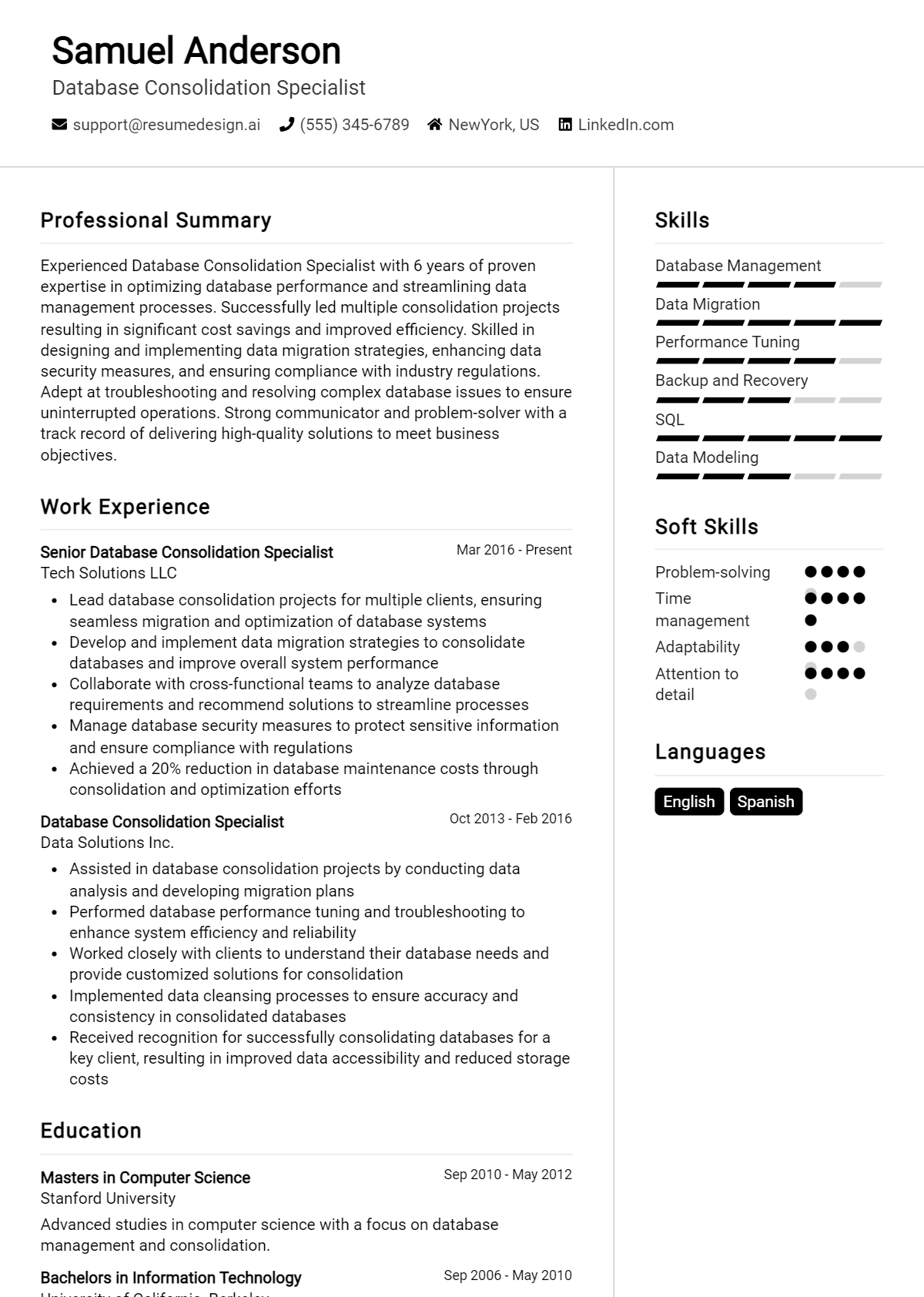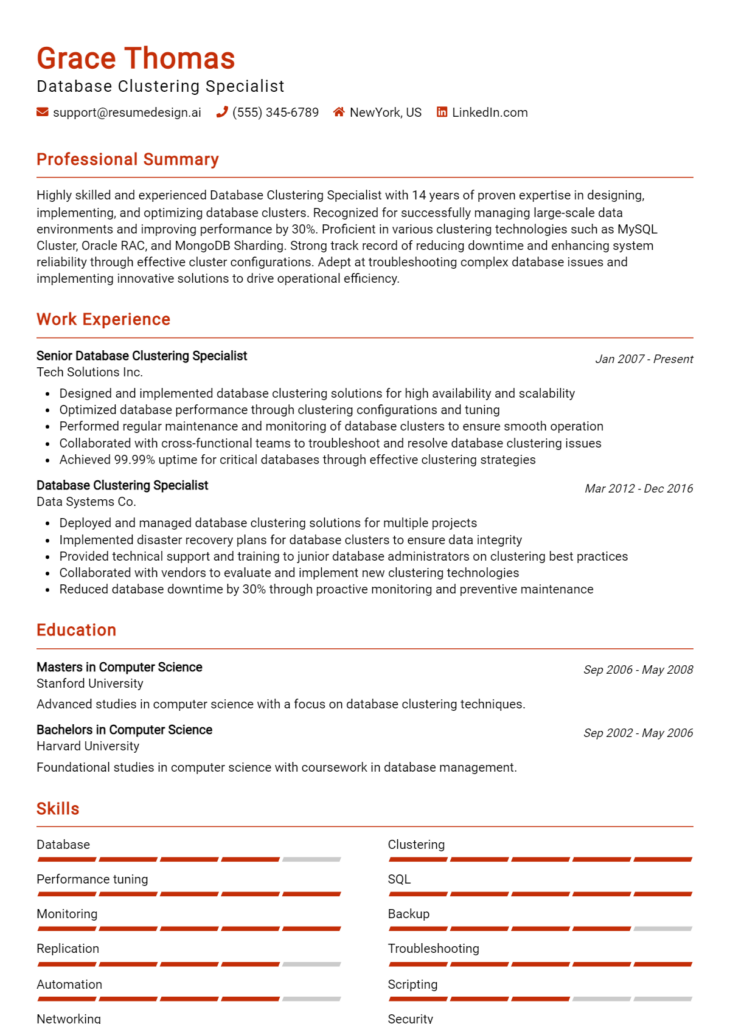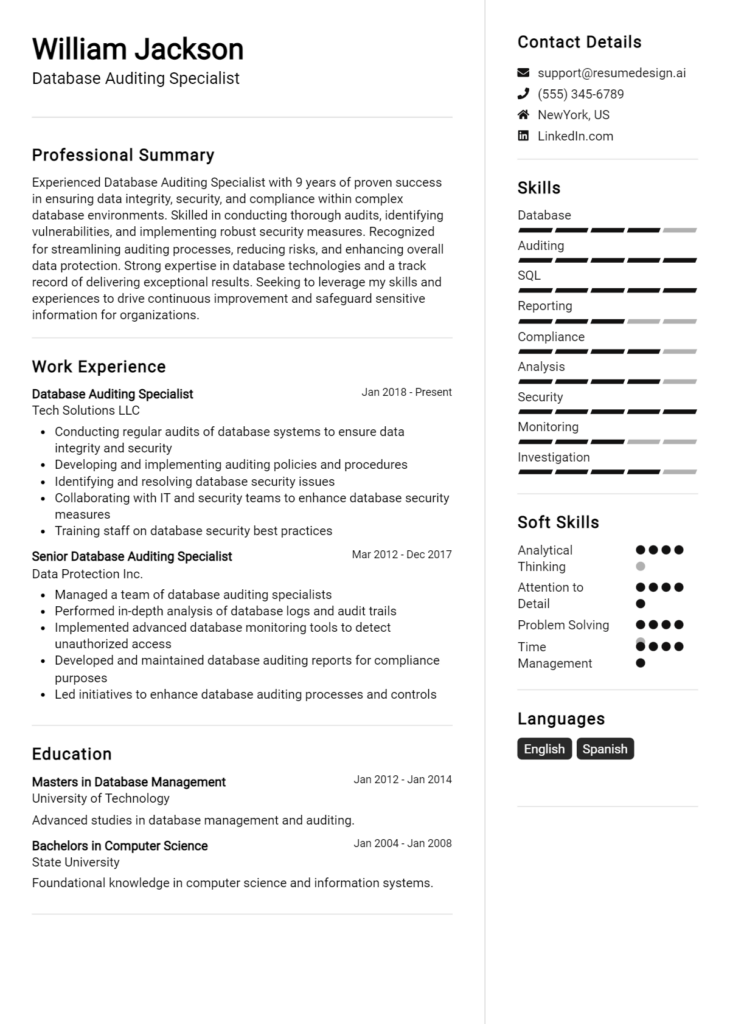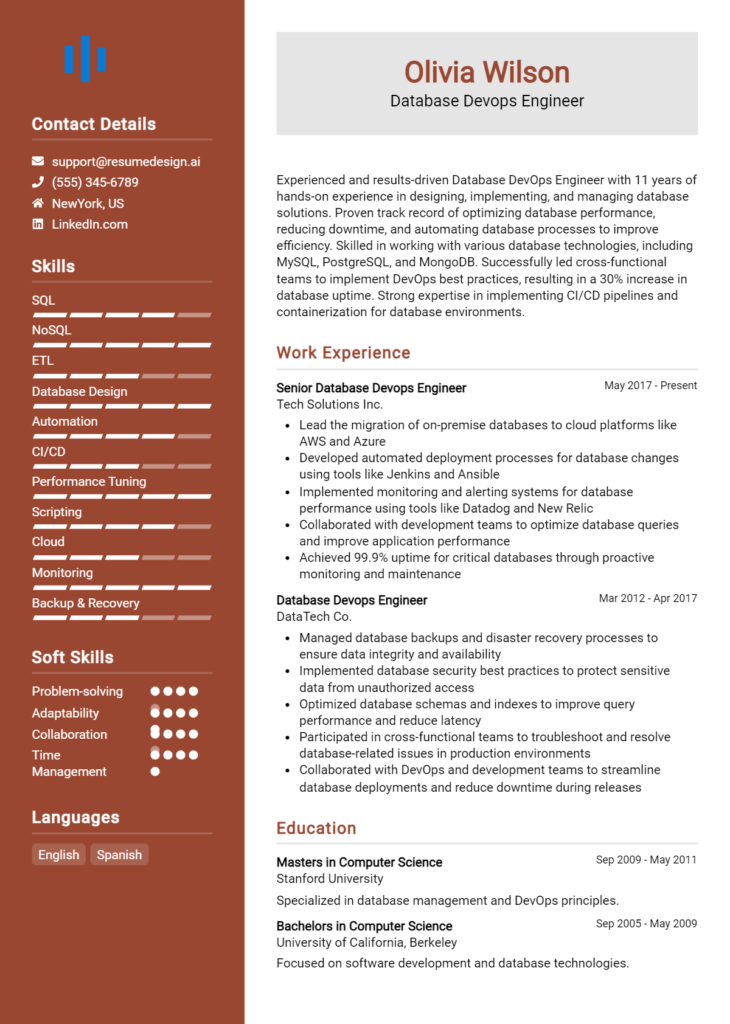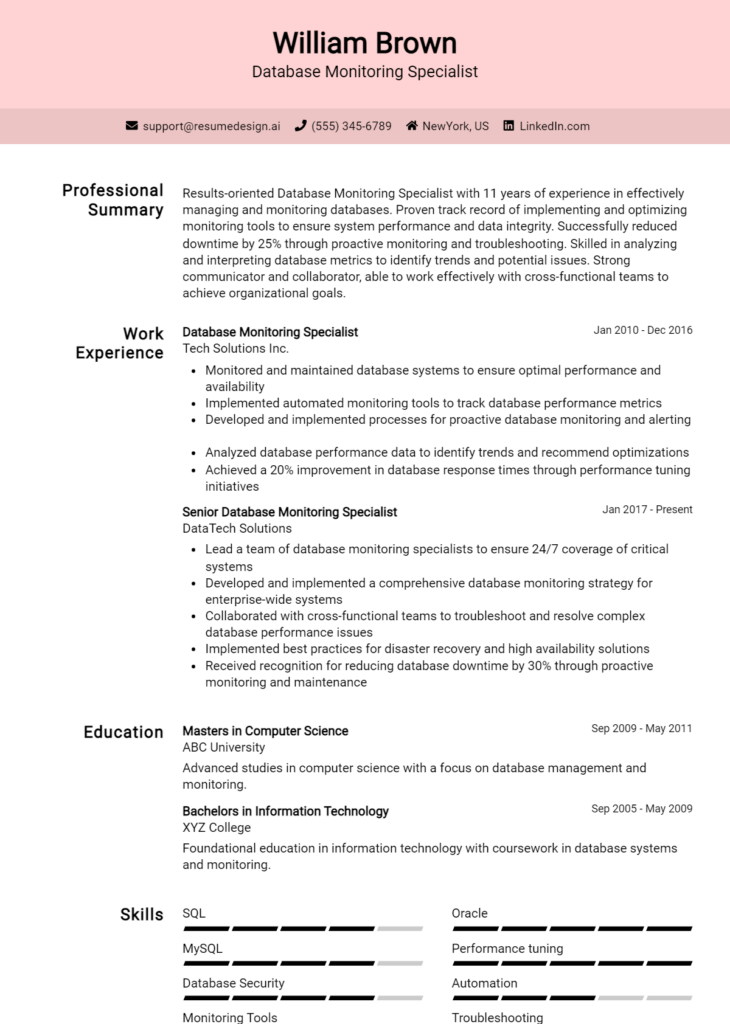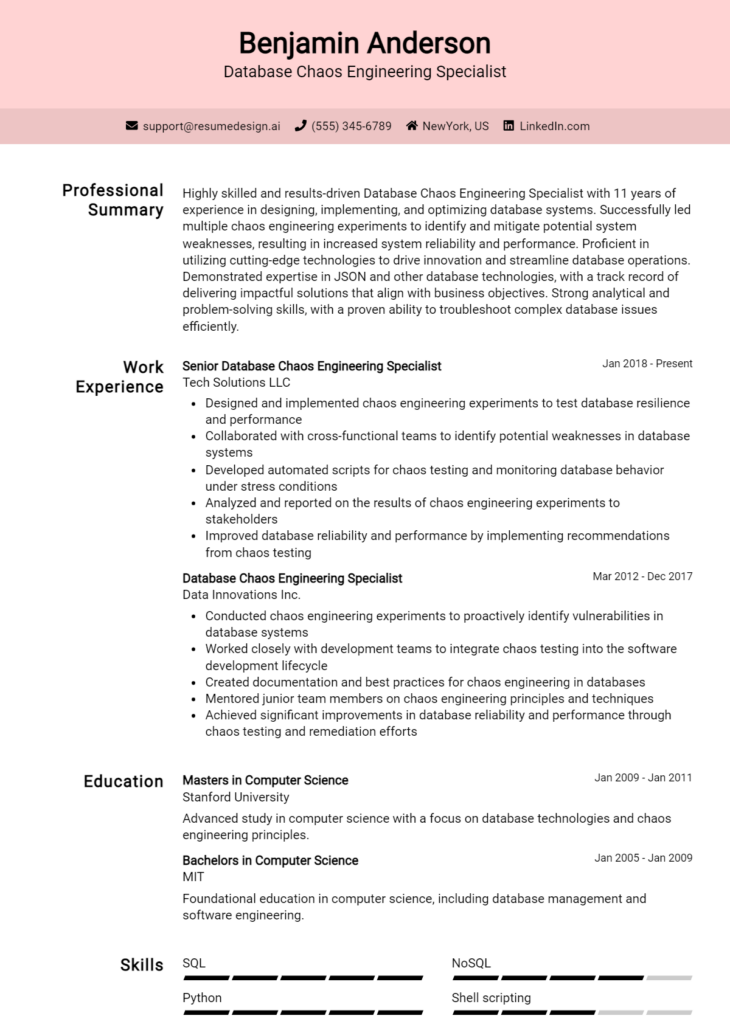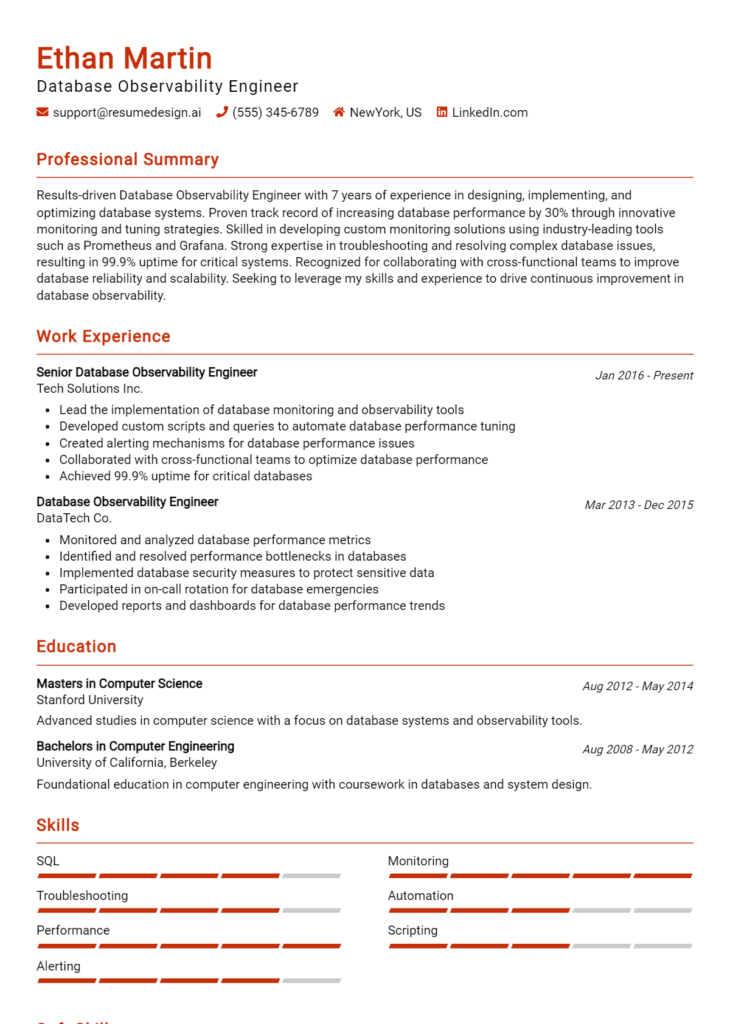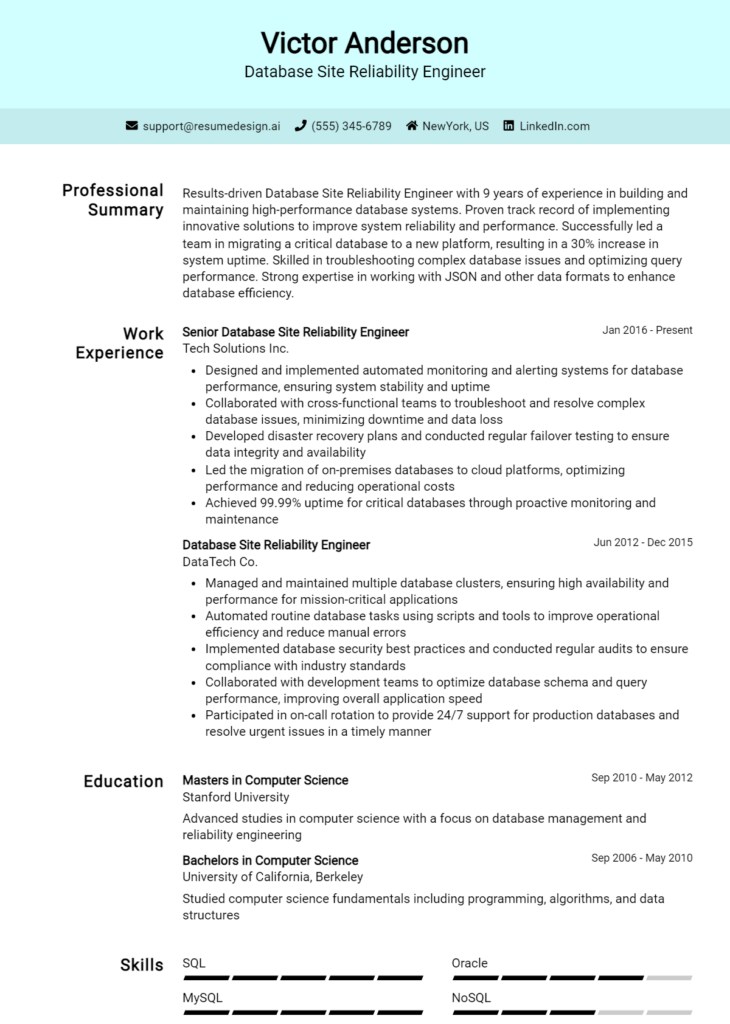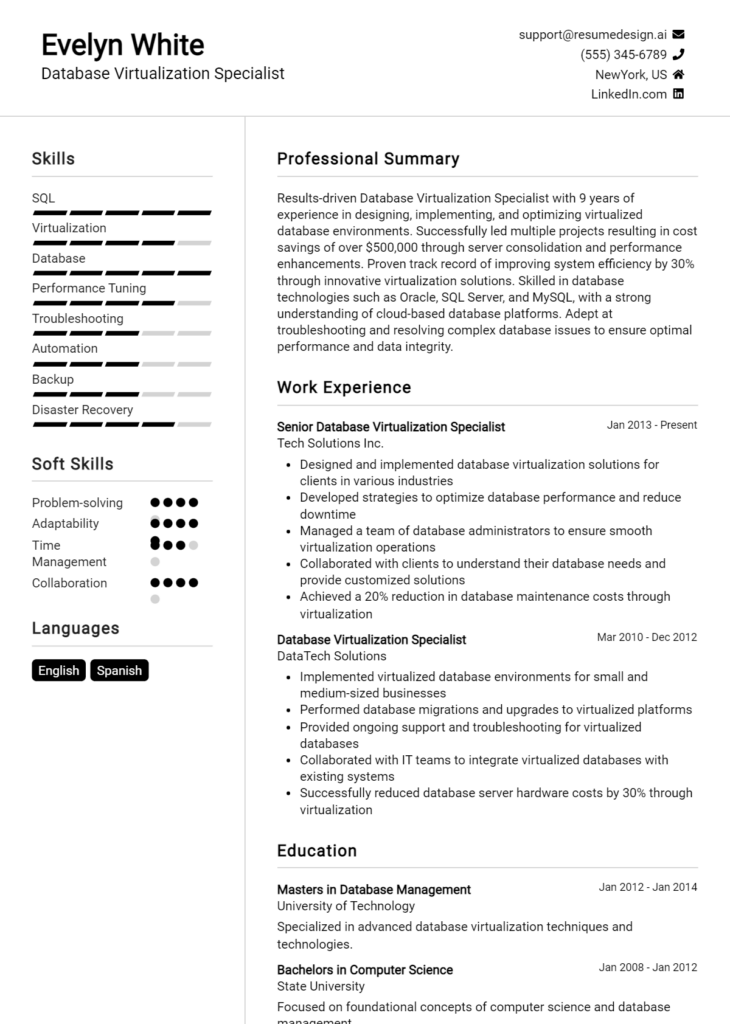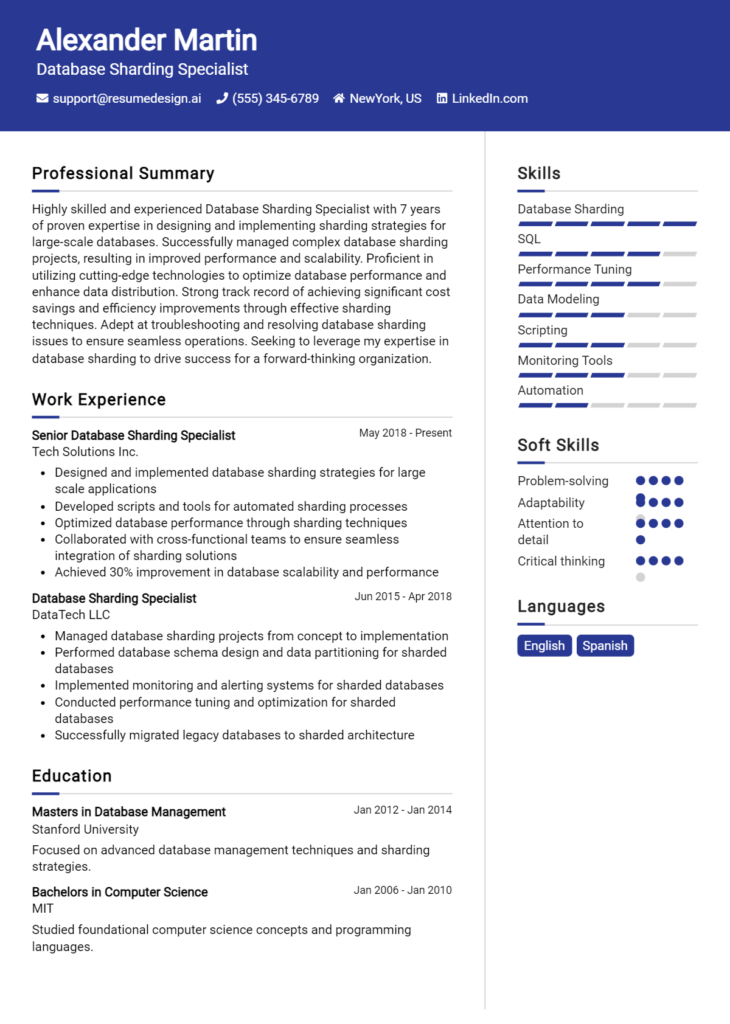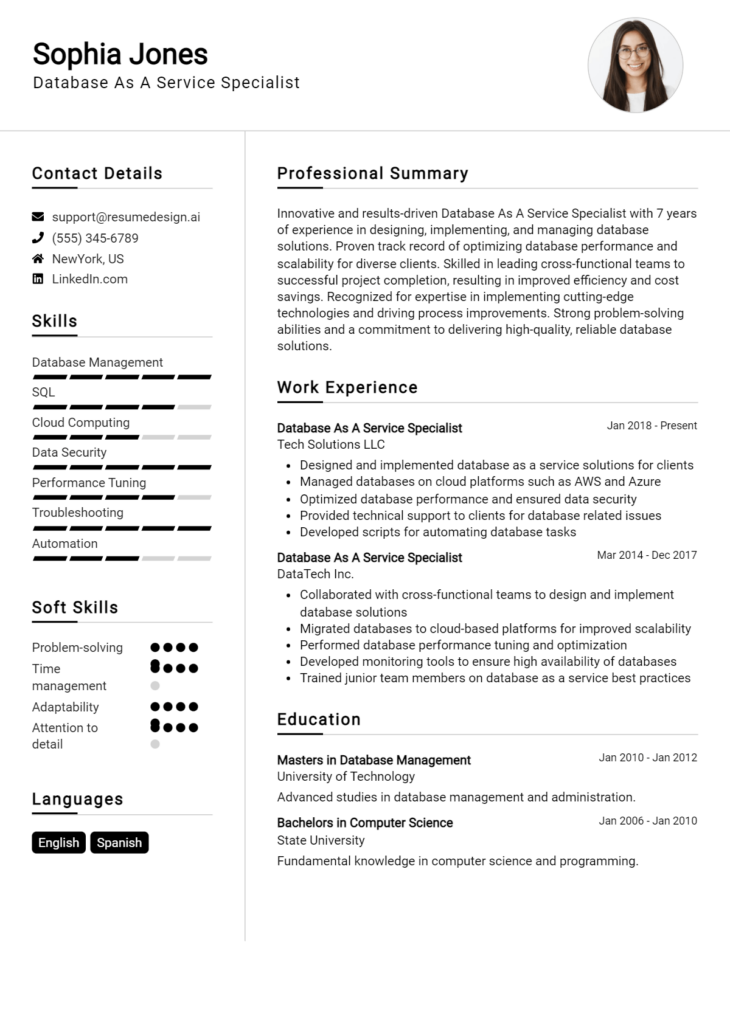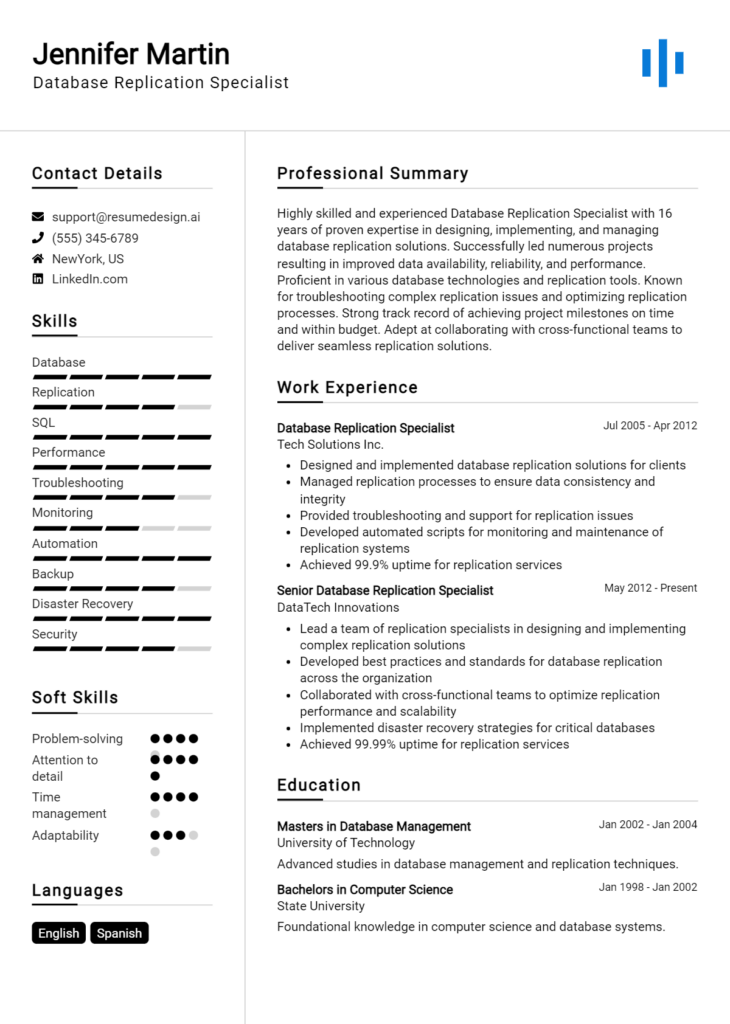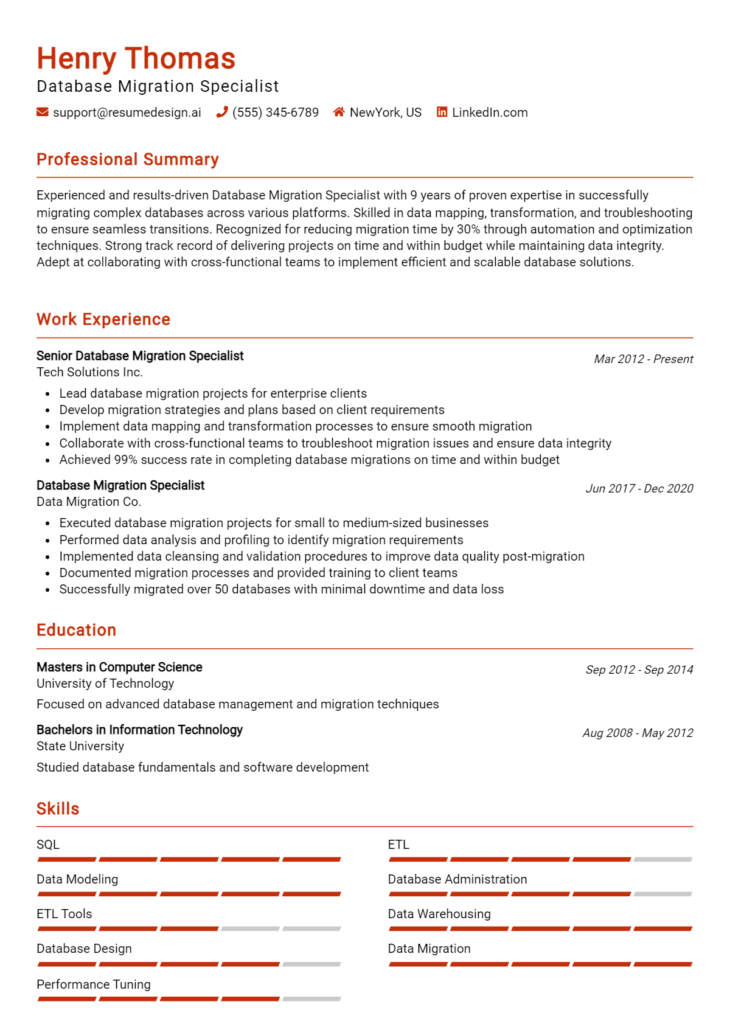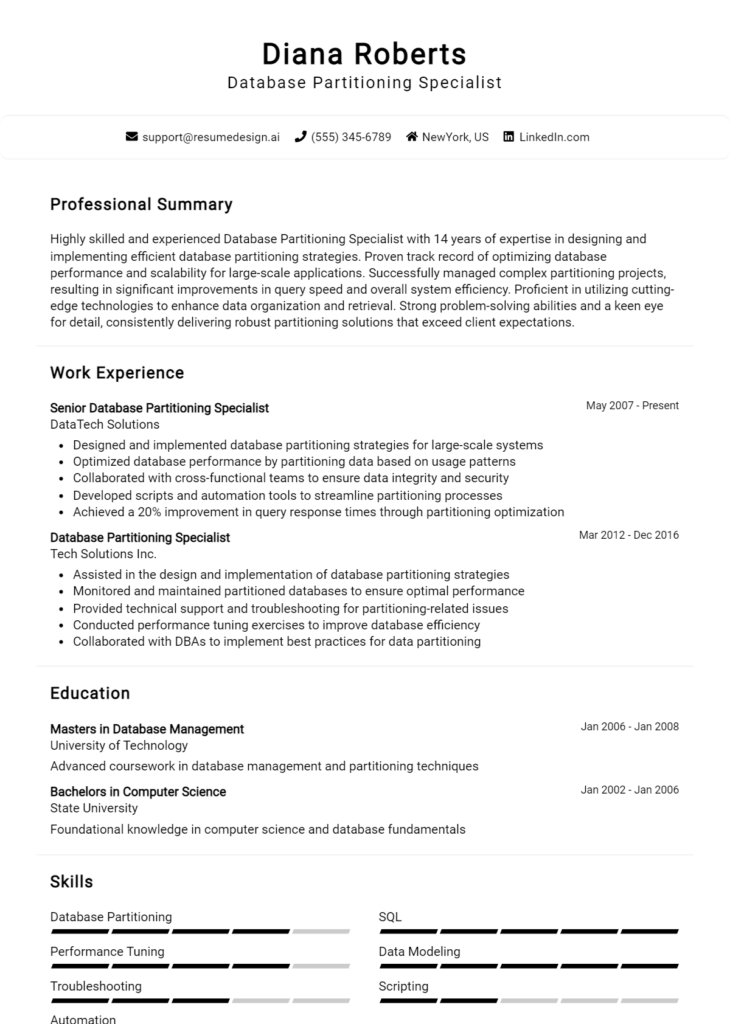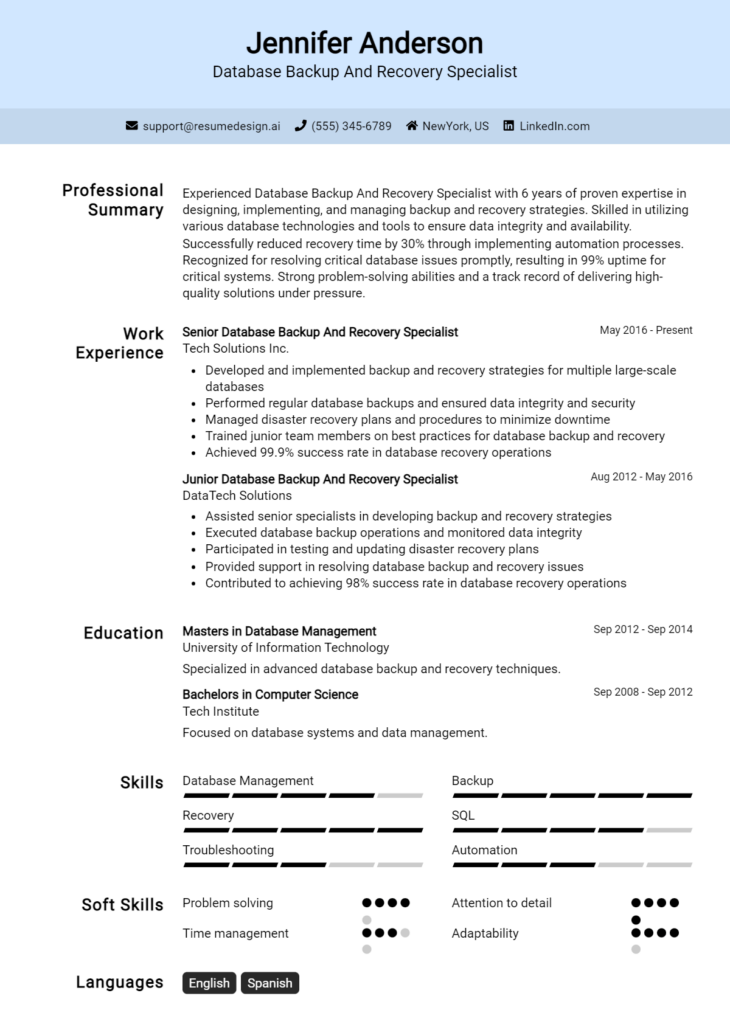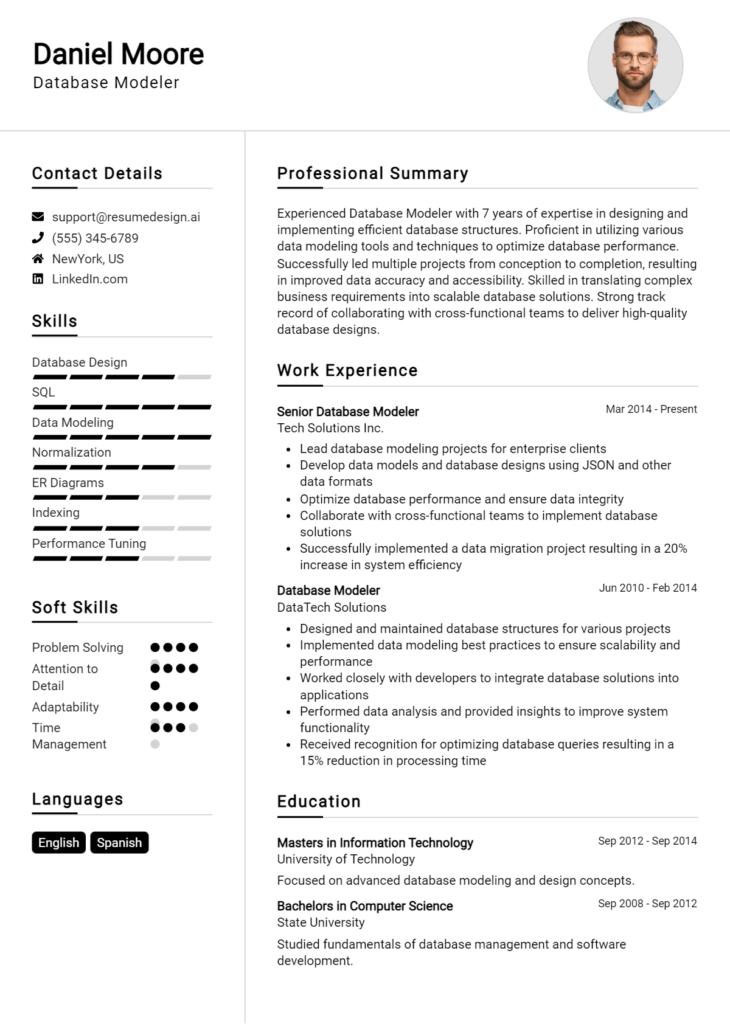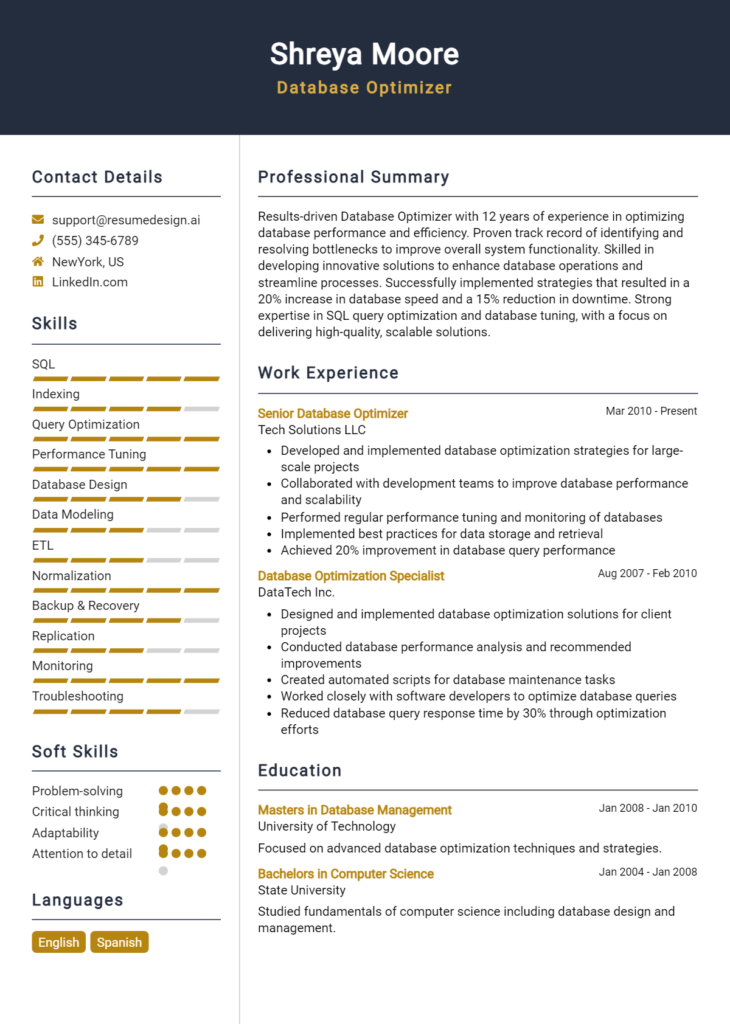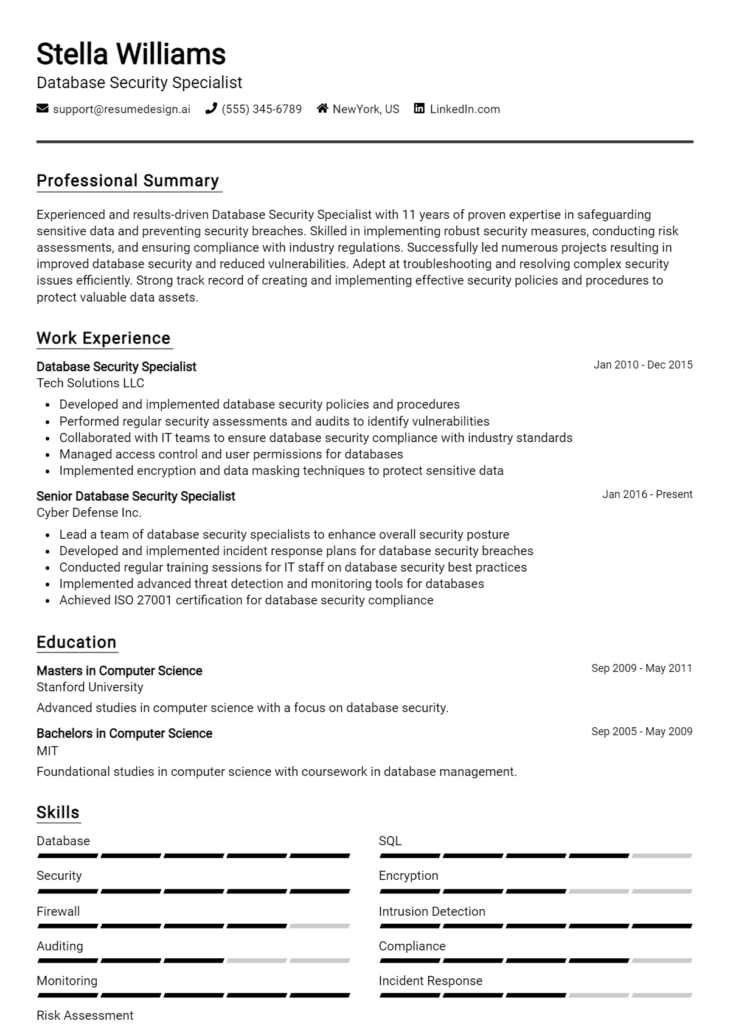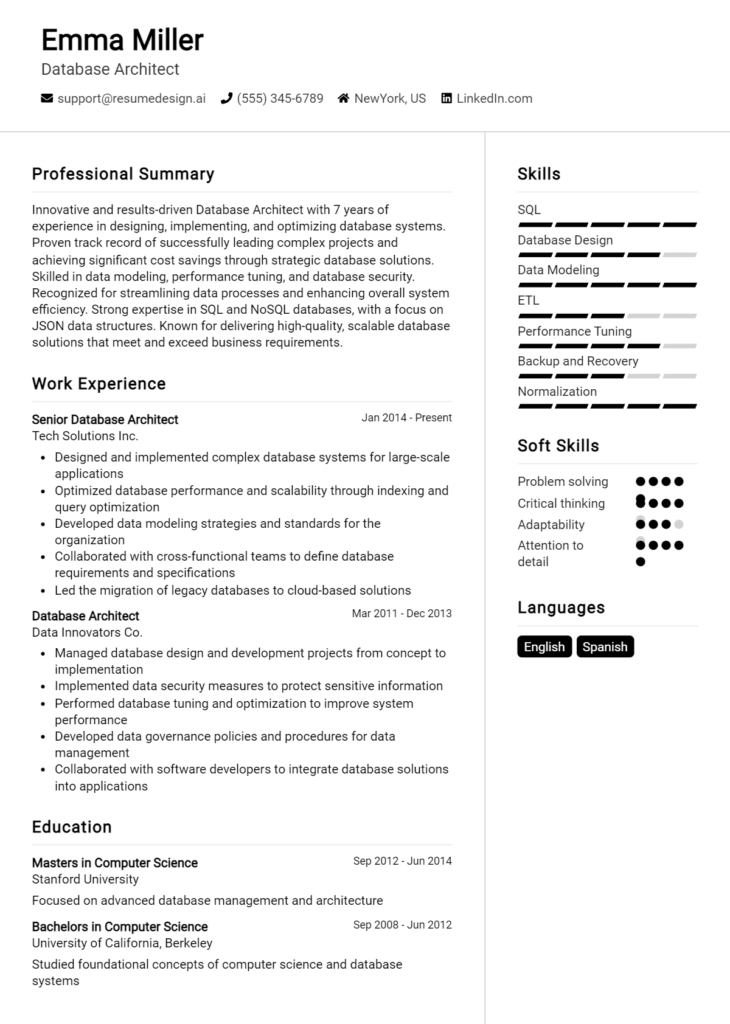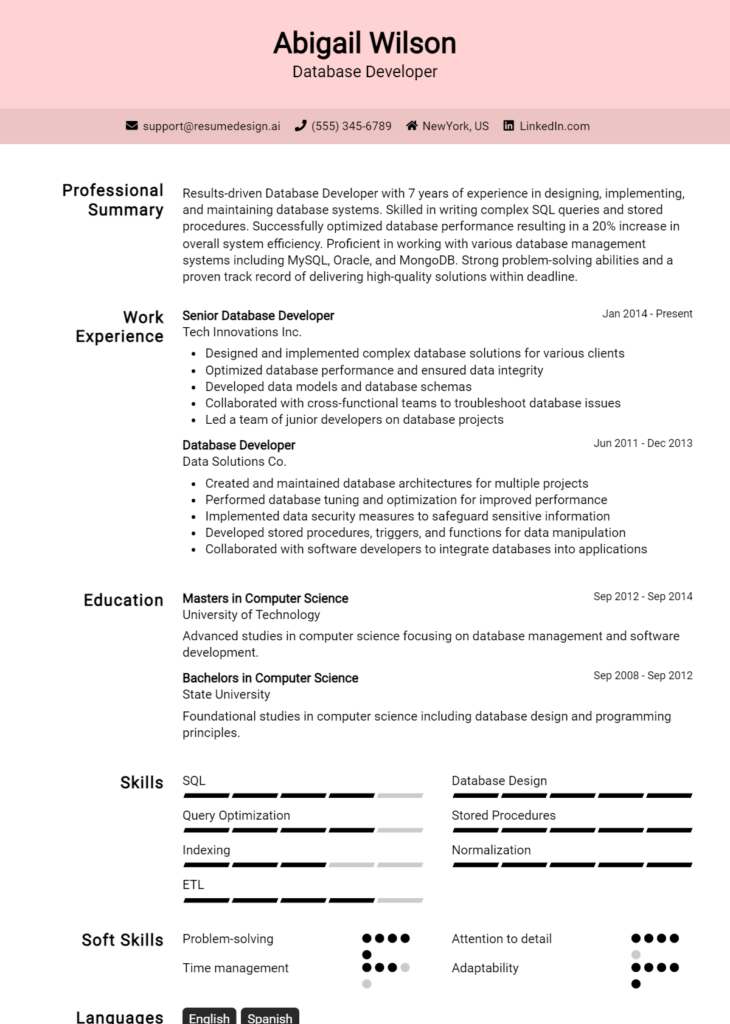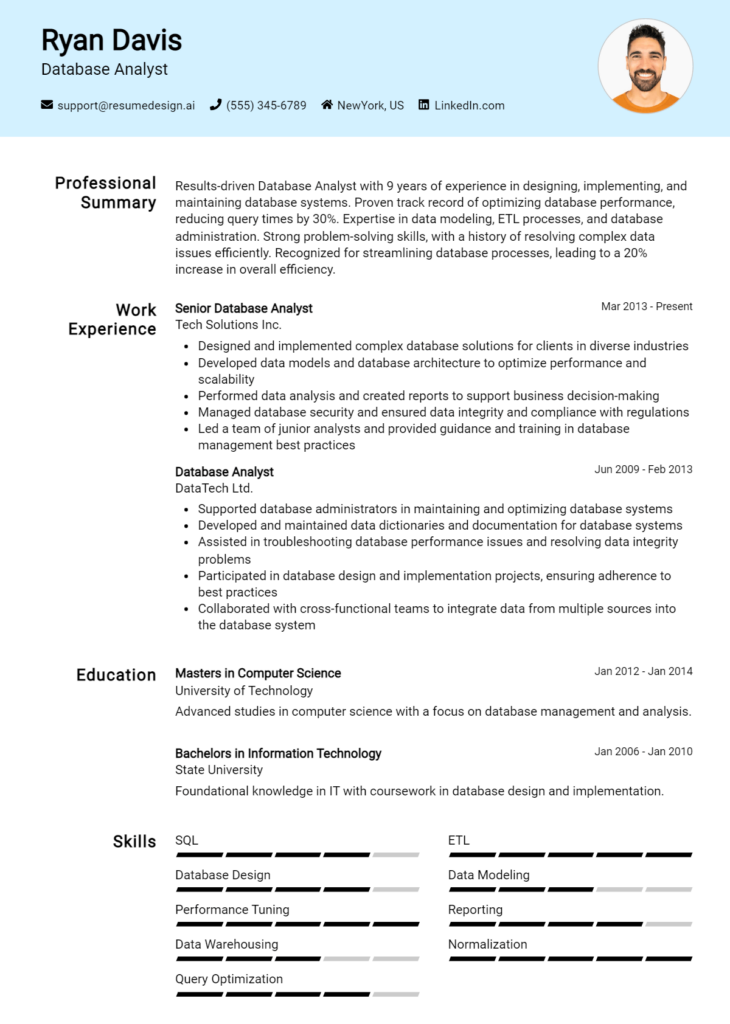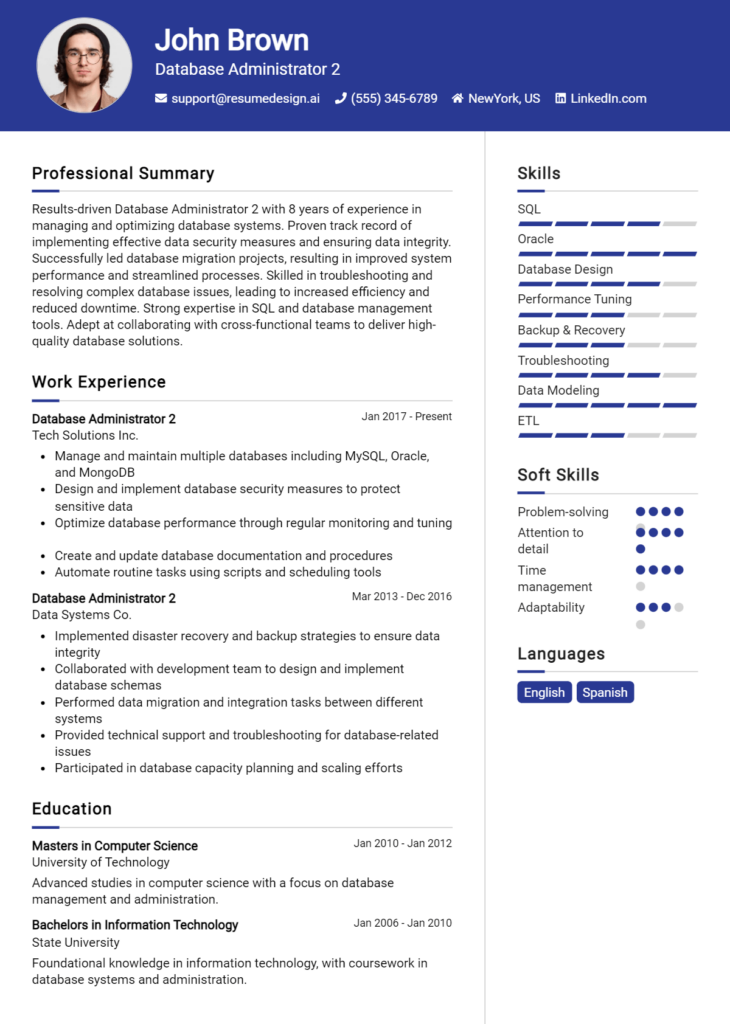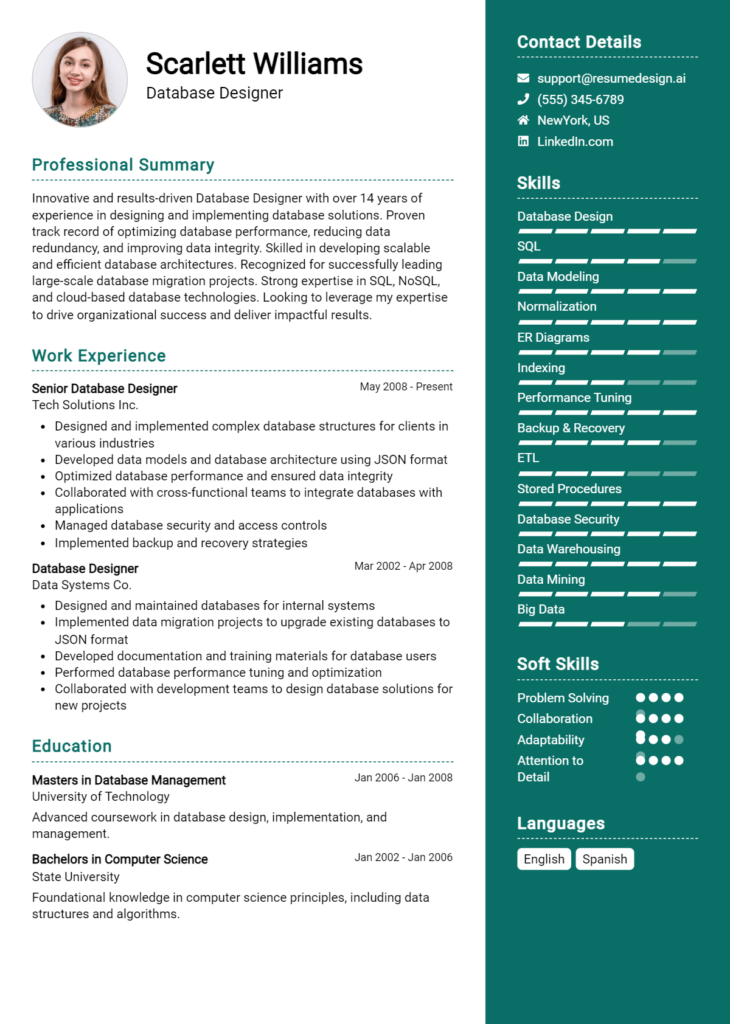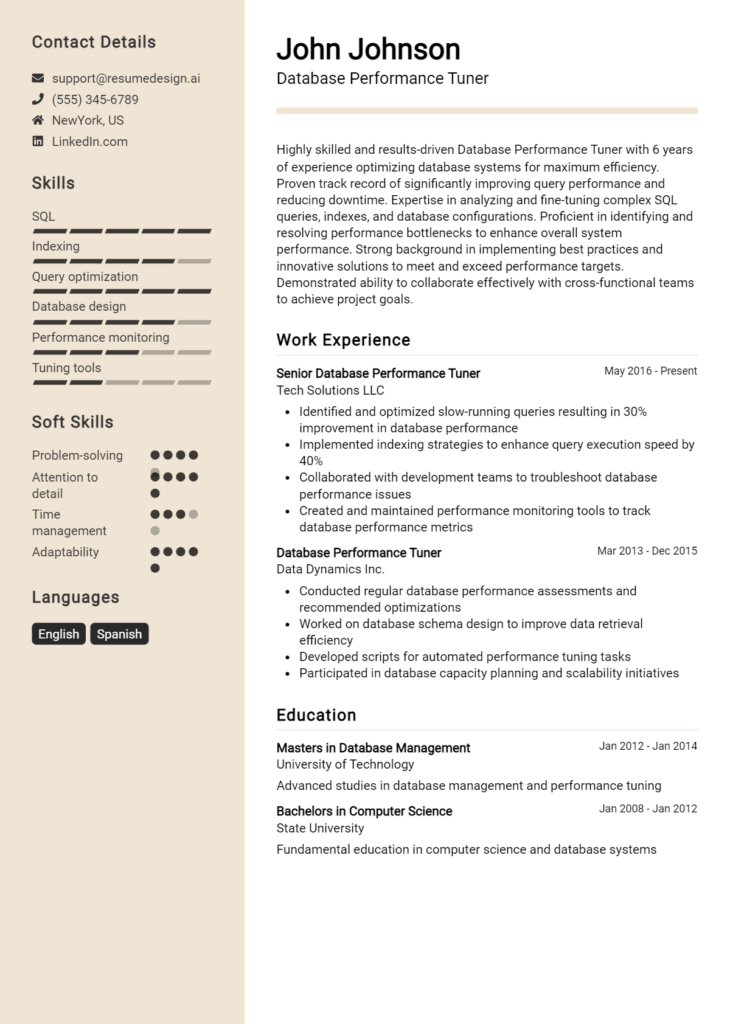Database Consolidation Specialist Core Responsibilities
A Database Consolidation Specialist plays a vital role in unifying data systems across various departments, ensuring seamless operations and improved data integrity. Key responsibilities include analyzing existing databases, implementing consolidation strategies, and collaborating with IT and business units to optimize data management solutions. Strong technical, operational, and problem-solving skills are essential for success, enabling the specialist to address complex challenges and drive organizational goals. A well-structured resume should effectively highlight these qualifications to attract potential employers.
Common Responsibilities Listed on Database Consolidation Specialist Resume
- Assessing current database systems for potential consolidation opportunities
- Developing and implementing database consolidation strategies
- Collaborating with IT and business stakeholders to ensure alignment
- Ensuring data integrity and security during the consolidation process
- Monitoring and optimizing database performance post-consolidation
- Creating documentation related to database architecture and processes
- Conducting training sessions for staff on new database systems
- Identifying and resolving data discrepancies and issues
- Utilizing data analytics tools to assess consolidation impacts
- Managing project timelines and coordinating with cross-functional teams
- Staying updated on industry trends and best practices in database management
High-Level Resume Tips for Database Consolidation Specialist Professionals
In the competitive landscape of database management, a well-crafted resume serves as a critical tool for Database Consolidation Specialist professionals. It is often the first impression a candidate makes on a potential employer, and it must effectively showcase both technical skills and past achievements. A compelling resume not only highlights your qualifications but also conveys your unique value proposition in streamlining database systems and enhancing data integrity. This guide will provide practical and actionable resume tips specifically tailored for Database Consolidation Specialist professionals, ensuring you stand out in the job market.
Top Resume Tips for Database Consolidation Specialist Professionals
- Tailor your resume to the specific job description by incorporating relevant keywords and phrases.
- Showcase your relevant experience in database management and consolidation, focusing on specific projects or roles.
- Quantify your achievements with metrics, such as percentage improvements in database performance or cost savings realized.
- Highlight industry-specific skills, including knowledge of database technologies like SQL, Oracle, or NoSQL.
- Include certifications or training that relate to database management and consolidation methodologies.
- Use clear and concise language, avoiding jargon unless it is widely recognized in the industry.
- Incorporate a professional summary at the top of your resume that encapsulates your experience and career goals.
- Utilize bullet points for easy readability, ensuring each point is impactful and relevant.
- Keep your resume format clean and professional, using consistent fonts and spacing to enhance visual appeal.
By implementing these tips, you can significantly increase your chances of landing a job in the Database Consolidation Specialist field. A focused and well-structured resume not only demonstrates your technical proficiency but also conveys your dedication to effective database management and optimization, making you an appealing candidate to potential employers.
Why Resume Headlines & Titles are Important for Database Consolidation Specialist
In the competitive landscape of job applications, a Database Consolidation Specialist must leverage every opportunity to stand out, starting with a compelling resume headline or title. These critical elements serve as the first impression for hiring managers, encapsulating a candidate's core qualifications in a concise and impactful phrase. A well-crafted headline not only grabs attention but also succinctly communicates the applicant's expertise, making it easier for recruiters to recognize their fit for the role. By ensuring that the title is relevant and directly related to the job being applied for, candidates can significantly enhance their chances of moving forward in the hiring process.
Best Practices for Crafting Resume Headlines for Database Consolidation Specialist
- Keep it concise: Aim for a headline that is brief yet informative, ideally one line long.
- Be role-specific: Tailor the headline to reflect the specific position of Database Consolidation Specialist.
- Highlight key skills: Include relevant skills or technologies that align with the job requirements.
- Use action words: Employ strong verbs that demonstrate your impact and contributions in previous roles.
- Incorporate metrics: When possible, quantify achievements to provide context and show results.
- Stay relevant: Ensure that the headline matches the job description and reflects current industry standards.
- Avoid jargon: Keep the language clear and accessible to all hiring professionals.
- Revise for clarity: Continuously refine the headline to maintain clarity and precision.
Example Resume Headlines for Database Consolidation Specialist
Strong Resume Headlines
"Results-Driven Database Consolidation Specialist with 7+ Years of Experience Streamlining Data Management Processes"
“Expert in Data Migration and Integration | Proven Track Record of Reducing Database Costs by 30%”
“Innovative Database Consolidation Specialist Specializing in SQL and NoSQL Solutions for Enhanced Data Efficiency”
Weak Resume Headlines
“Database Specialist Looking for a Job”
“Experienced Professional Seeking Opportunities”
The strong headlines are effective because they are specific, informative, and directly related to the Database Consolidation Specialist role. They highlight key qualifications and achievements, making it easy for hiring managers to see the candidate's value at a glance. In contrast, the weak headlines fail to impress as they lack detail and do not convey any unique strengths or relevant experience. By avoiding generic language and focusing on impactful messaging, candidates can significantly improve their chances of catching the attention of potential employers.
Writing an Exceptional Database Consolidation Specialist Resume Summary
A resume summary is a critical element for a Database Consolidation Specialist, as it serves as the first impression a potential employer will have of a candidate's qualifications. A well-crafted summary quickly captures the attention of hiring managers by succinctly showcasing key skills, relevant experience, and noteworthy accomplishments that align with the job role. This brief yet impactful statement should be concise and tailored specifically to the job being applied for, effectively setting the tone for the rest of the resume and increasing the chances of securing an interview.
Best Practices for Writing a Database Consolidation Specialist Resume Summary
- Quantify Achievements: Use specific numbers and metrics to provide context to your accomplishments.
- Focus on Skills: Highlight both technical and soft skills that are relevant to database consolidation.
- Tailor the Summary: Customize your summary for each job application by aligning it with the job description.
- Be Concise: Aim for 2-4 sentences that clearly convey your value without unnecessary fluff.
- Use Action Words: Start sentences with strong action verbs to convey your contributions effectively.
- Showcase Relevant Experience: Mention past roles or projects that directly relate to database consolidation.
- Highlight Problem-Solving Abilities: Emphasize your capacity to tackle challenges and improve efficiencies.
- Maintain Professional Tone: Ensure the language used is professional and appropriate for the industry.
Example Database Consolidation Specialist Resume Summaries
Strong Resume Summaries
Results-driven Database Consolidation Specialist with over 7 years of experience in streamlining data processes for Fortune 500 companies. Successfully consolidated 15+ databases, reducing redundancy by 40% and improving data retrieval times by 60%.
Detail-oriented Database Consolidation Specialist adept at implementing data architecture strategies that enhance efficiency. Led a team to integrate disparate data sources, achieving a 30% reduction in operational costs while maintaining data integrity.
Proficient Database Consolidation Specialist with a proven track record of migrating legacy systems to cloud-based solutions. Orchestrated the consolidation of 10 databases, improving data access speed by 50% and ensuring compliance with industry regulations.
Weak Resume Summaries
Experienced database specialist looking for opportunities in database management.
Database professional with skills in various data tools and technologies, seeking a challenging role.
The strong resume summaries stand out because they provide specific achievements, quantify results, and directly relate to the job of a Database Consolidation Specialist. They demonstrate a clear understanding of the role and show potential contributions to the organization. In contrast, the weak summaries are vague, lacking detail and measurable outcomes, which diminishes their impact and fails to attract the attention of hiring managers.
Work Experience Section for Database Consolidation Specialist Resume
The work experience section of a Database Consolidation Specialist resume is crucial as it serves as a testament to the candidate's technical skills, team management capabilities, and commitment to delivering high-quality products. This section not only outlines the candidate's professional background but also highlights their ability to implement database consolidation strategies, optimize performance, and ensure data integrity. By quantifying achievements and aligning their experience with industry standards, candidates can effectively demonstrate their value and expertise to potential employers.
Best Practices for Database Consolidation Specialist Work Experience
- Highlight specific technical skills related to database management systems, consolidation techniques, and data migration tools.
- Quantify achievements with metrics such as percentage improvements in performance, cost savings, or reduced downtime.
- Showcase experience managing and collaborating with cross-functional teams to align database strategies with business objectives.
- Include relevant certifications or training that support your expertise in database technologies.
- Describe successful project outcomes, emphasizing your role in driving these results.
- Use action-oriented language to convey a proactive approach in addressing challenges and implementing solutions.
- Align experiences with industry best practices and standards to demonstrate your commitment to quality and efficiency.
- Tailor your work experiences to match the requirements of the job you are applying for, ensuring relevance and impact.
Example Work Experiences for Database Consolidation Specialist
Strong Experiences
- Led a successful database consolidation project that resulted in a 30% reduction in operational costs and a 25% increase in query performance for a major retail client.
- Managed a cross-functional team of 10 to integrate multiple databases into a single unified system, improving data accessibility and reducing retrieval times by 40%.
- Developed and implemented a comprehensive data migration strategy that achieved a 99.9% data integrity rate during a large-scale consolidation, exceeding industry standards.
- Coordinated with stakeholders to align database strategies with business goals, resulting in a 15% increase in overall system efficiency.
Weak Experiences
- Worked on various database projects and assisted in data management tasks.
- Helped with some database consolidation efforts without any specific achievements mentioned.
- Participated in team meetings to discuss database issues and solutions.
- Gained experience in databases through general tasks and responsibilities.
The examples of strong experiences are considered effective because they clearly illustrate quantifiable outcomes, specific technical leadership roles, and successful collaboration with teams, showcasing the candidate's impact on projects. In contrast, the weak experiences lack detail, specificity, and measurable results, failing to demonstrate the candidate's true capabilities and contributions in the field of database consolidation.
Education and Certifications Section for Database Consolidation Specialist Resume
The education and certifications section of a Database Consolidation Specialist resume is crucial in establishing the candidate's qualifications and expertise in the field. This section serves as a testament to their academic background, showcasing relevant degrees that provide foundational knowledge in databases and data management. Additionally, industry-relevant certifications highlight the candidate's commitment to professional development and mastery of current technologies and best practices. By including relevant coursework, certifications, and any specialized training, candidates can significantly enhance their credibility and demonstrate alignment with the specific demands of the job role, making them more attractive to potential employers.
Best Practices for Database Consolidation Specialist Education and Certifications
- Focus on relevant degrees such as Computer Science, Information Technology, or Database Management.
- Include industry-recognized certifications like Microsoft Certified: Azure Database Administrator Associate or Oracle Database SQL Certified Associate.
- Highlight specialized training in database consolidation tools and methodologies.
- Provide detailed descriptions of coursework that directly relates to data management and consolidation.
- List any continuing education courses or workshops attended to showcase commitment to learning.
- Ensure that certifications are up-to-date and relevant to current industry trends.
- Incorporate any practical experience or projects completed during academic training that align with consolidation practices.
- Be concise, ensuring that the education and certification details are easy to read and understand.
Example Education and Certifications for Database Consolidation Specialist
Strong Examples
- Bachelor of Science in Computer Science, University of Technology, 2021
- Microsoft Certified: Azure Database Administrator Associate, 2022
- Oracle Database SQL Certified Associate, 2023
- Coursework in Data Warehousing and Database Design, University of Technology, 2020
Weak Examples
- Associate Degree in General Studies, Community College, 2019
- Certification in Basic Computer Skills, 2018
- Old certification in SQL Server 2008, 2015
- Bachelor's degree unrelated to technology, University of Arts, 2020
The examples classified as strong are relevant and specific to the Database Consolidation Specialist role, showcasing degrees and certifications that directly enhance the candidate's qualifications. They reflect current knowledge and skills essential for the position. In contrast, the weak examples are either outdated, irrelevant, or not aligned with the required skill set, which could detract from the candidate's credibility and competitiveness in the job market.
Top Skills & Keywords for Database Consolidation Specialist Resume
As a Database Consolidation Specialist, possessing the right skills is crucial for effectively managing and optimizing multiple databases into a streamlined system. These professionals play a pivotal role in enhancing data integrity, reducing redundancy, and ensuring seamless access to information across an organization. When crafting a resume, highlighting relevant skills can significantly improve the chances of capturing the attention of hiring managers. A well-rounded skill set, comprising both hard and soft skills, demonstrates not only technical proficiency but also the ability to collaborate and communicate effectively within a team. By focusing on these essential skills, candidates can showcase their qualifications and readiness for the challenges of database consolidation.
Top Hard & Soft Skills for Database Consolidation Specialist
Soft Skills
- Strong analytical thinking
- Excellent problem-solving abilities
- Effective communication skills
- Attention to detail
- Team collaboration
- Adaptability and flexibility
- Time management
- Critical thinking
- Project management
- Customer service orientation
Hard Skills
- Proficiency in SQL and database management systems
- Experience with data migration tools
- Knowledge of database design principles
- Familiarity with data warehousing concepts
- Expertise in data cleansing and normalization
- Understanding of cloud database solutions
- Competence in data modeling and architecture
- Ability to write complex queries
- Experience with performance tuning and optimization
- Familiarity with compliance and data governance standards
For more information on how to enhance your skills and effectively showcase your work experience, consider exploring additional resources to tailor your resume for the Database Consolidation Specialist role.
Stand Out with a Winning Database Consolidation Specialist Cover Letter
I am writing to express my interest in the Database Consolidation Specialist position at your esteemed organization. With a robust background in database management, data migration, and system integration, I am well-prepared to contribute to your team and help streamline your data processes. My experience in consolidating multiple databases into unified systems has equipped me with the skills necessary to enhance data accessibility, improve operational efficiency, and mitigate risks related to data redundancy.
In my previous role at XYZ Corporation, I successfully led a project to consolidate over ten disparate databases into a single, cohesive system. This initiative not only resulted in a 30% reduction in storage costs but also improved data retrieval times by 40%. My expertise in SQL and various database management systems, combined with my proficiency in data mapping and transformation, enables me to ensure a seamless transition during the consolidation process. I am adept at collaborating with cross-functional teams, gathering requirements, and providing training to end-users to maximize the benefits of the new system.
Moreover, I am committed to maintaining data integrity and security throughout the consolidation process. I have implemented best practices for data governance and have experience with compliance regulations, ensuring that all data handling aligns with industry standards. My analytical skills allow me to troubleshoot issues proactively and devise innovative solutions that meet both technical and business needs. I am excited about the opportunity to bring my unique skill set to your organization and help optimize your database operations for future growth.
Common Mistakes to Avoid in a Database Consolidation Specialist Resume
When crafting a resume as a Database Consolidation Specialist, it's crucial to avoid common pitfalls that can undermine your chances of landing an interview. A well-structured resume not only highlights your technical skills and experience but also reflects your understanding of the industry's nuances. Below are some frequent mistakes to steer clear of when preparing your resume, ensuring you present yourself as a strong candidate for the role.
Lack of Specificity: Failing to detail specific databases or technologies you've worked with can leave hiring managers in the dark about your expertise. Use precise terms like "SQL Server," "Oracle," or "PostgreSQL" to showcase your proficiency.
Overly Technical Jargon: While technical skills are essential, using too many acronyms or complex terms can alienate non-technical recruiters. Aim for clarity to ensure your resume is accessible to all reviewers.
Ignoring Quantifiable Achievements: Listing responsibilities without showcasing measurable outcomes (like "reduced database retrieval time by 30%") diminishes the impact of your accomplishments. Use numbers to illustrate your contributions.
Neglecting Soft Skills: Focusing solely on technical skills can create an incomplete picture. Highlighting soft skills such as teamwork, communication, and problem-solving is vital, especially in collaborative environments.
Generic Objective Statements: Using a one-size-fits-all objective can make your resume feel impersonal. Customize your objective to reflect your specific goals and how they align with the potential employer's needs.
Inconsistent Formatting: A resume with inconsistent fonts, sizes, or bullet points can appear unprofessional. Maintain uniform formatting throughout for a polished and organized look.
Omitting Continuous Learning: In a rapidly evolving field like database management, failing to mention ongoing education or certifications can make your resume seem outdated. Include relevant training to demonstrate your commitment to professional growth.
Not Tailoring for Each Application: Sending the same resume for every job application is a missed opportunity. Tailor your resume to align with the job description, emphasizing relevant experiences and skills that match the specific role.
Conclusion
As we conclude our exploration of the Database Consolidation Specialist role, it's essential to highlight the critical skills and experiences that can make you stand out in this competitive field. Key points discussed include the importance of proficiency in database management systems, data migration strategies, and the ability to streamline processes for efficiency. Additionally, we emphasized the value of strong analytical skills and the capacity to work collaboratively with cross-functional teams.
Given the increasing demand for database consolidation specialists, it's the perfect time to ensure your resume reflects your qualifications accurately. A polished and professional resume can be the difference between landing an interview and being overlooked. We encourage you to take a moment to review your Database Consolidation Specialist resume and ensure it aligns with industry expectations.
To assist you in this process, consider utilizing available resources such as resume templates, which can provide a solid foundation for your document. Additionally, explore our resume builder for a user-friendly experience in crafting your resume. Don't forget to check out resume examples for inspiration tailored to your role, and enhance your application with our professional cover letter templates.
Take action today—revamp your resume and position yourself as a top candidate for Database Consolidation Specialist opportunities!

